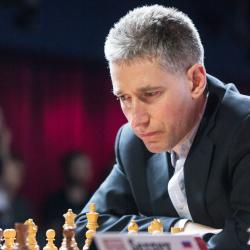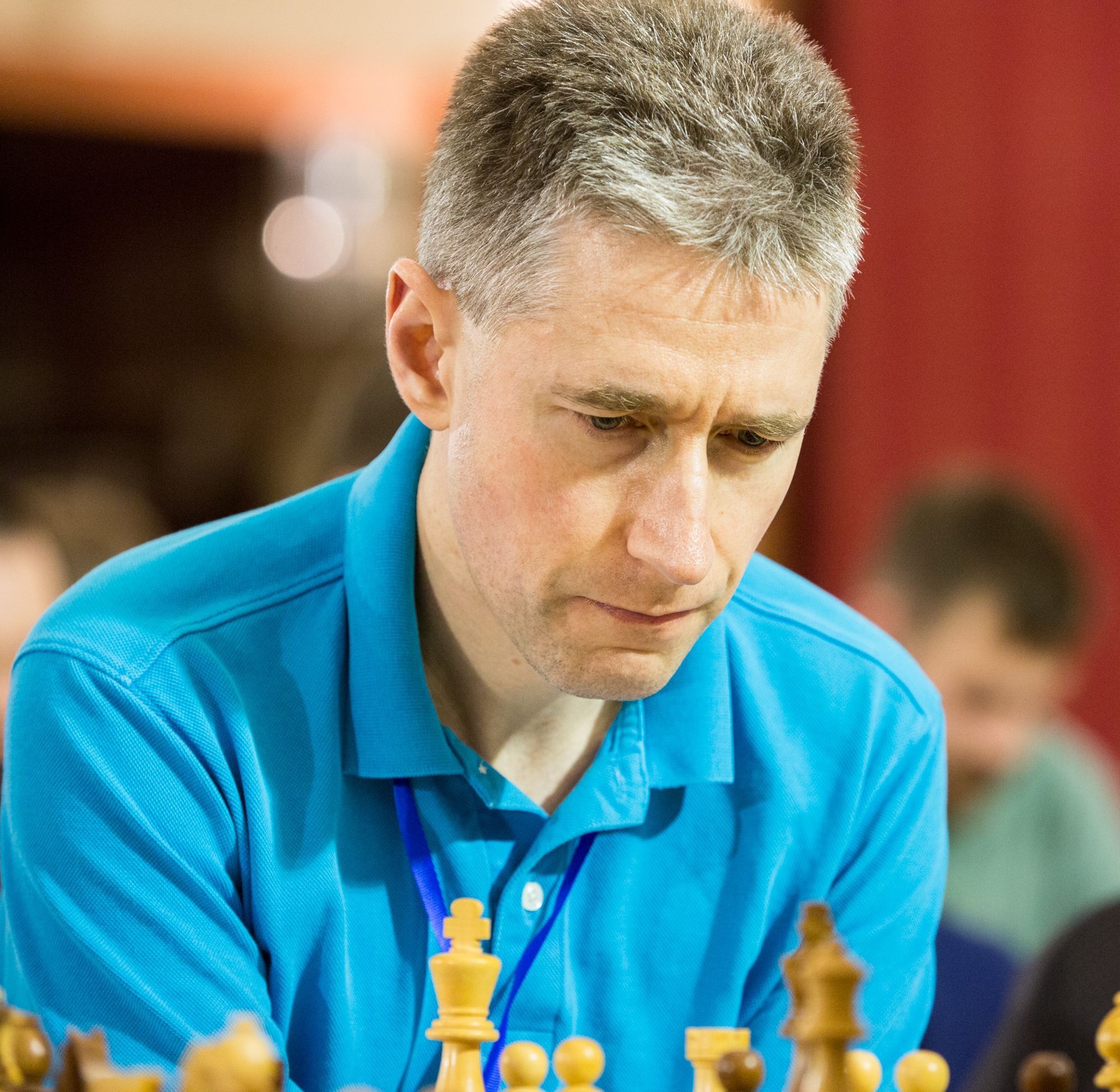GM Michael Adams

Bio
Michael “Mickey” Adams is a British chess grandmaster, one of the United Kingdom's and England’s greatest-ever players, with eight national championships. Per his website, he has finished first or tied for first in at least 60 events in his chess career.
Early Life And Career
Born in Cornwall, England’s most southwestern county, in late 1971, Adams was a highly successful junior player (as most future super GMs are). In 1981, when he was nine, he won Cornwall’s under-18 championship. He shared first in Britain’s under-18 championship at age 13 and won its under-21 title outright at age 15.
That same year, 1987, he finished second at the World Youth Championship and earned his IM title. By 1989, he claimed his first overall British Championship as well as the GM title—all by the age of 18.
Early 1990s
As strong as British chess was as the 1980s became the 1990s, Adams was good enough for the English Olympiad team in 1990. It would be the first of 13 consecutive appearances for Adams in the premier world team event. He also played his first Interzonal tournament, finishing 25th of 64 in Manila with a 7/13 score. In December 1990 and January 1991, Adams won two events in the Netherlands, Groningen and Wijk aan Zee respectively.
It was another Englishman, GM Nigel Short, who emerged from the 1990-93 qualification process to play for the world title but not before splitting from FIDE. GM Garry Kasparov defeated Short. After the split, Adams would try to earn both Kasparov’s classical title and FIDE’s.
World Championship Attempts
Adams shared first with GM Viswanathan Anand at Groningen in 1993, essentially an interzonal tournament for the classical world championship. Adams edged GM Sergei Tiviakov 7.5-6.5 in the first round of the PCA Candidates, the decisive game that he once called his most memorable game (below). However, Adams was soundly defeated 5.5-1.5 by Anand in the semifinal, as Anand went on to lose to Kasparov in the championship.
For the 1996 FIDE championship, Adams finished fifth in 1993 at the Biel Interzonal, but FIDE was beginning to overhaul its championship procedures. Instead of a Candidates tournament, FIDE immediately ran a four-round knockout tournament for its world championship. Adams fell to GM Boris Gelfand in the first round, and GM Anatoly Karpov eventually retained his FIDE title.
FIDE then switched its world championship into a nearly annual 100- to 128-player knockout tournament. Adams was one of the most consistent performers, a semifinalist more often than not. He played in all five, first in 1998 that was technically a Candidates tournament but was followed within days by a short match with the champion Karpov, and then four official world championship events in 1999, 2000, 2002, 2004. Adams advanced to the fourth round in each of them and made the final four on four occasions.

Unfortunately, Adams never emerged as FIDE champion, coming closest as a finalist in 2004 before losing to GM Rustam Kasimdzhanov. Adams came back twice to tie the main six-game match, losing games two and four but winning games three and five. In the rapid playoff, he lost the first game with white and then drew with black, thus leaving Kasimdzhanov as the champion.
As the runner-up, Adams was invited to the eight-player 2005 championship, which ultimately led to the reunification of the world championship a year later. However, he finished just seventh in what ended up his last best chance at a world title. Since then, he has not reached a traditional Candidates tournament. (In 2007 he lost in the first round of a two-round, 16-player knockout event where the final four reached an eight-player championship tournament.) His closest call was the 2015 World Cup where he lost in the fourth round to GM Hikaru Nakamura.
Other Tournaments
It was no surprise that Adams had so much success in FIDE’s 1998-2004 championship events, given his success elsewhere. By 1994, he was the world number-12 and strong enough to defeat Karpov in their game at Dortmund while finishing second in the event. In 1996 Adams joined the top 10 in the world, then eclipsed a 2700 rating on the July 1998 rating list. Consistently a top-10 player, he was top-five from July 2000 to October 2002.
During this period, nearly every year seemed to bring Adams at least one strong top-level international tournament. In 1998 he shared first with GMs Vladimir Kramnik and Peter Svidler at Dortmund. The next year at Dos Hermanas he won outright by a half-point over Kramnik. In 2000, he finished an undefeated shared second behind Kasparov in Sarajevo. Adams also had one of his best Olympiads in 2004, with the third-best board-one performance at 10/13 points.
Over time, Adams began to rack up British championships as well. His second came in 1997 and a third and fourth in back-to-back years, 2010 and 2011. Three more followed in recent years.
Recent Years
Adams quietly remained an active top-30 player with a 2700 rating into his 40s. He dominated Dortmund 2013 at age 41 with five wins and four draws to defeat Kramnik by a half-point and the rest of the field by at least 2.5 points. In 2020 alone he played the Gibraltar Masters, Biel, and FIDE Online Olympiad tournaments.
In the meantime, Adams remained one of Britain’s premier players. He was their first board at the Olympiad, up to his final appearance in 2014 when he was the second-best individual performer in the tournament. In 2016, ’18, and ’19 he added national championships five through seven. He won his eighth in 2023, and later in the year won his first World Senior Championship in the age 50+ division.
Adams followed that up with a victory at the 2023 London Chess Classic, after which he said, "I think in many ways it’s probably my best-ever result! Because other tournaments that I won were when I was in my prime as a player, and it’s... a completely different challenge to play [against] people so much younger than yourself."

Even while Adams remains active, he has already built a significant legacy, especially in his home country. His peak rating of 2761, reached in 2013, is the highest ever achieved by an English player by nearly 50 points. Only Nigel Short, who ranked third in the late 1980s, has reached a higher world ranking than Adams’ fourth position in the early 2000s. Adams’ seven British championships are the most since the country’s chess boom that began in the 1970s.
In all, few grandmasters from any country can claim as strong a career as Michael Adams.


